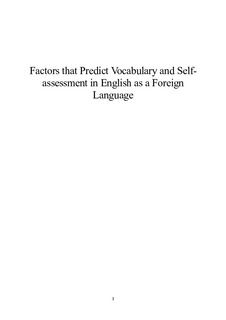| dc.description.abstract | The current study (N=196) researches how students learn English as a foreign language (EFL). It aims to find out which factors influence English learning, and which are more influential than others. The factors included in this study are age, amount of time spent on English-speaking media, number of years spent actively learning English, number of months spent abroad in general, and in English speaking countries in particular, how much the participants enjoy speaking English, and perceived usefulness of learning English. The study makes use of a questionnaire, which was distributed on various social media. On the questionnaire, the participants were asked to assess their EFL proficiency, and complete an online vocabulary test. Four separate multiple regression analyses were then used to analyze the results. The research questions addressed in the study are:
1. Which factors affect EFL vocabulary size?
2. Which factors affect self-assessed proficiency in EFL?
3. Which factors affect EFL skills in general?
According to this study, the factors researched have a stronger effect on self-assessed proficiency than vocabulary size. Enjoyment of English and time spent on English-speaking media heavily influenced both self-assessment and vocabulary size, which led to the conclusion that they most likely affect EFL proficiency in general as well. Additionally, perceived usefulness of English and time spent studying English both proved to be significant predictors of self-assessed proficiency. Finally, the study found a high correlation between vocabulary size and self-assessed proficiency. The cause and effect relationship between these variables is quite ambiguous, but it does signify that these variables influence each other, and that the results of the self-assessment analyses are also applicable to EFL proficiency in general. | nb_NO |
